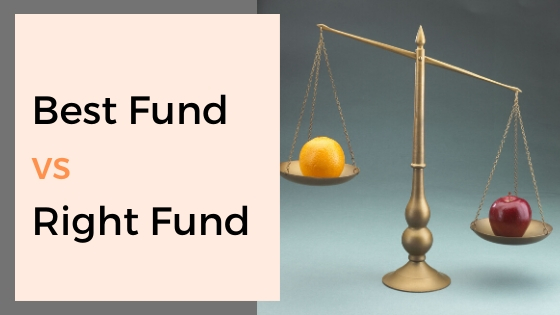- +91 9892515948
-



The Right Fund vs Best Mutual Fund
Every one of us wants the best things in the world. The best clothes, shoes, cars and the list goes on. Seeking the best things is fine in all the other areas but not when it comes to selecting a mutual fund to invest.
It is easy to get swayed by the best mutual fund that is giving eyeball popping returns in the last six months. But is it a good option to go for this best mutual fund? The answer is, it depends.
It depends on whether this best fund is also the right fund for you. The right fund will vary from individual to individual. There are a number of factors that need to be considered to arrive at the right fund. By the right fund, we mean the most appropriate fund for a particular investor. The appropriate fund for someone who wants to stay invested for 10 years will vary from a person who wants to stay invested for just 10 months.
The investment horizon, risk-taking capacity, age, urgency of the goal are some of the factors that will help to decide whether the fund is right for you or not.
So, let’s understand what will be the right fund for you based on these factors:
Investment horizon:Investment horizon is the time that you would want to remain invested. Also, your investment horizon for your different goals will be different. You may want to stay invested for 10 years to buy a house, which may not be the same for a short term goal. If your investment horizon is short, then you can invest in a mutual fund that carries low risk. Liquid fund to short term debt funds is ideal investment options if your investment horizon is less than three years.
Risk-taking capacity: Not everyone can take the same level of risk. A young professional who has recently started working may not be willing to take a higher risk as the person may have no prior experience in investing in equities. On the other hand, a person who has been investing in equities will have a higher risk-taking capacity as he/she understands the risk associated with investing in equities. The person will be better emotionally prepared to handle the volatility in the stock market, than someone who hasn't invested in equities.
Age:Age is also a crucial factor which helps to decide the right fund. The financial needs of individuals belonging to different age groups will be different. A person in their 20s has a goal of buying a bike or travelling the world, while a person in their late 50s may want to create a sustainable monthly source of income. Hence, the route taken by the two individuals will be different. For the person in 20s, equity funds may be the best option to fulfil their long term financial goals. On the other hand, the person who is going to be retired, setting up a Systematic Withdrawal Plan from a debt fund with extremely low risk will help him to take care of his needs after retirement.
The urgency of the goal: We may have a lot of financial goals but there are a few goals that we can’t compromise. These goals are most likely to be short term goals. Planning for these goals will be different than the goals that are not very urgent. A higher allocation of the investment corpus may go towards fulfilling the urgent goals. Also, to make sure that you earn higher returns with moderate risk, you may have to invest in two or more mutual fund schemes. Depending on the time horizon of your goals, it may be a mix of equity and debt funds. Your financial advisor will be able to help you out with the detailed planning.
Conclusion:The factors such as time horizon, risk taking capacity, age and urgency of the goal should not be considered in silos. These factors are dependent on each other. It is always prudent to seat and discuss all these criteria with your financial advisor, who considering all these can help you to choose the right scheme for you.
Sumedh Training academy LLP
1C 202 New Ashok nagar Vazira naka
Borivali west Mumbai 400091
+91 9892515948